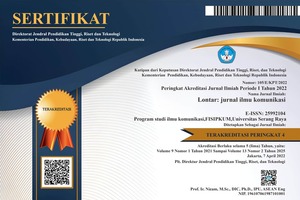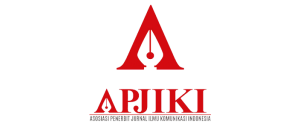KOMODIFIKASI INFORMASI DAN KONSTRUKSI MEDIA MASSA
DOI:
https://doi.org/10.30656/lontar.v3i1.349Abstract
Ada sejumlah media memberitakan harga beras dan cabe yang naik tajam. Bersamaan dengan itu, hampir semua media menyiarkan banyak “berita besar,†berita yang menjadi aras utama (mainstream) – tentang pengadilan wisma atlet, kerusuhan di Bima, pemanggilan tokoh oleh KPK, contohnya, atau siaran langsung sidang DPR di Senayan. Umumnya, berita-berita besar ditempatkan pada jam utama (dan diulang-ulang) di televisi, atau di halaman satu koran, sementara kenaikan harga beras atau cabe hanya ditempatkan di “rubrik ekonomi-bisnis,†di halaman dalam. Berita-berita besar, dipandang lebih memiliki news value ketimbang berita kenaikan harga beras. Semua media berkomitmen bahwa berita-berita yang disajikannya untuk memenuhi kepentingan publik. Berita-berita besar dipandang memiliki kadar kepentingan publik yang lebih besar ketimbang berita-berita lain – berita tentang kenaikan harga BBM, beras dan cabe, tarif angkutan, misalnya atau informasi tentang program dana bantuan sosial untuk penduduk miskin seperti Raskin dan BLSM. Namun, apakah ibu-ibu rumah tangga dan para petani peduli dengan apa yang terjadi di Senayan? – dibandingkan dengan informasi tentang harga beras dan cabe. Petani adalah produsen dua komoditas ini, sedangkan ibu-ibu rumah tangga adalah konsumennya. Jumlah keduanya, seperti kita tahu, amat besar, mayoritas. Apakah mereka bukan publik media?Kita memiliki media dengan jumlah lebih dari cukup untuk memenuhi kebutuhan informasi masyarakat kita. Berita-berita yang disiarkan juga sangat banyak dan bervariasi. Namun hanya sedikit informasi yang secara langsung fungsional bagi sebagian besar publik. Situasi ini dikonsepsikan – dalam metafor – sebagai banjir informasi. Sebagai banjir (air), tidak banyak air yang bisa diminum; sebagai banjir informasi, tidak banyak informasi yang memiliki kemanfaatan praktis. Kepentingan publik tak terhubung dengan informasi yang dipasokkan media, atau dalam istilah Postman, terjadi dikontekstualisasi. Bagaimana hal ini bisa terjadi? Apa pengaruhnya terhadap kualitas informasi?Downloads
Published
Issue
Section
License
By submitting an article to the journal, the author(s) agree to transfer the published article's copyright to the journal, which will act as the publisher. This means the journal will have the right to publish the article in various forms, including reprints. The journal will maintain the publishing rights to the published articles.
In line with the license, authors and third parties (readers, researchers, and others) are allowed to share and adapt the material. In addition, the material must be given appropriate credit, provided with a link to the license, and indicated if changes were made. If authors remix, transform, or build upon the material, authors must distribute their contributions under the same license as the original.






